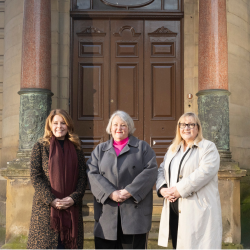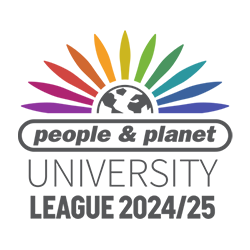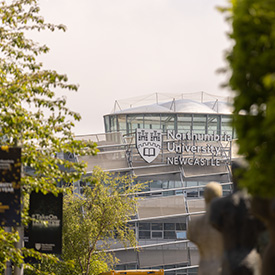-
Study
-
Undergraduate
- Search for a Course
- Undergraduate Open Day & Events
- Application Guides
- Northumbria University UCAS Exhibitions
- Foundation Years
- Undergraduate Fees & Funding
- School & College Outreach
- Continuing Professional Development
-
Postgraduate
- Postgraduate Study Degree
- Postgraduate Research Degrees
- Postgraduate Open Days and Events
- Postgraduate Fees & Funding
- Flexible Learning
- Thinking about a Masters?
- Continuing Professional Development
- Change Direction
-
Student Life
- The Hub - Student Blog
- Accommodation
- Life in Newcastle
- Support for Students
- Careers
- Information for Parents
- Students' Union
- Northumbria Sport
- Be Part of It
-
-
International
International
Northumbria’s global footprint touches every continent across the world, through our global partnerships across 17 institutions in 10 countries, to our 277,000 strong alumni community and 150 recruitment partners – we prepare our students for the challenges of tomorrow. Discover more about how to join Northumbria’s global family or our partnerships.
View our Global Footprint-
Applying to Northumbria
- European Union
- Our London Campus
- Northumbria Pathway
- International Events
- Entry Requirement and Education Country Agents
- Global Offices
-
Northumbria Language Centre
- Faculty Requirements
- Acceptable English Requirements
- Pre-sessional English Language and Study Skills
- Academic Language Skills Programmes (ALS)
-
International Fees, Funding & Scholarships
- International Undergraduate Fees
- International Undergraduate Funding
- International Masters Fees
- International Masters Funding
- International Postgraduate Research Fees
- International Postgraduate Research Funding
- International Money Matters
-
Life at Northumbria
- International student support
- Careers
-
International Mobility
- Current Northumbria Students
- Incoming Exchange Students
-
-
Business
Business
The world is changing faster than ever before. The future is there to be won by organisations who find ways to turn today's possibilities into tomorrows competitive edge. In a connected world, collaboration can be the key to success.
More on our Business Services -
Research
Research
Northumbria is a research-rich, business-focused, professional university with a global reputation for academic quality. We conduct ground-breaking research that is responsive to the science & technology, health & well being, economic and social and arts & cultural needs for the communities
Discover more about our Research -
About Us
-
About Northumbria
- Our Strategy
- Our Staff
- Place and Partnerships
- Student Profiles
- Alumni Profiles
- Leadership & Governance
- Academic Departments
- University Services
- History of Northumbria
- Contact us
- Online Shop
-
-
Alumni
Alumni
Northumbria University is renowned for the calibre of its business-ready graduates. Our alumni network has over 246,000 graduates based in 178 countries worldwide in a range of sectors, our alumni are making a real impact on the world.
Our Alumni - Work For Us
What will I learn on this module?
On this cutting-edge module you will explore two important cities – Newcastle and Amsterdam – to compare and contrast key criminological and sociological issues in both places. The module offers important insights into the city in which you study (Newcastle) and, in Amsterdam, a city that features regularly in the media and academic literature – a place often portrayed as innovative, liberal, sometimes controversial and somewhere other cities could learn lessons from . On the module you will consider several important issues such as the way in which both cities have developed and evolved; the relations between both cities; the way crime and society operates in both cities; and how crime and other social issues are governed. A key part of the module is the Amsterdam fieldtrip where you visit Amsterdam, be taken on tours of the city, and conduct small group fieldwork on an important issue in the city (for instance, sex work, drugs, policing, the night-time economy, and tourism), and consider whether Newcastle should emulate ‘Amsterdam-style’ policies.
How will I learn on this module?
As well as classroom learning, you will take part on a fieldtrip of Amsterdam. Before going on the fieldtrip, you will take part in lectures and seminars where you will learn about the history, geography, politics and culture of both cities, and consider the key criminological and sociological issues within both cities. On the fieldtrip, you will engage in whole class activities such as tours, and take part in small group fieldwork, all of which will help you develop an in-depth understanding of the city of Amsterdam.
How will I be supported academically on this module?
On the module you will be academically supported in several ways. First, the teaching team will be available in person in the classroom and throughout the fieldtrip to guide you through the module and answer any questions. Second, you will be able to email the teaching team and meet them during set office hours to ask questions. Third, prior to the fieldtrip you will be allocated a supervisor who will guide you through the process of conducting research in Amsterdam. Fourth, the module has an online electronic learning portal website including a module handbook that guides you through many frequently asked questions.
What will I be expected to read on this module?
All modules at Northumbria include a range of reading materials that students are expected to engage with. Online reading lists (provided after enrolment) give you access to your reading material for your modules. The Library works in partnership with your module tutors to ensure you have access to the material that you need.
What will I be expected to achieve?
Knowledge & Understanding:
1. To compare criminological and sociological issues in Newcastle and Amsterdam.
2. To explore the historical changes in the ways in which both cities are governed.
3. To evaluate the success of urban policies in Amsterdam and the potential for Newcastle to emulate these policies.
Intellectual / Professional skills & abilities:
1. To develop and enhance skills in collecting, interpreting and presenting data.
Personal Values Attributes (Global / Cultural awareness, Ethics, Curiosity) (PVA):
1. To develop an awareness and curiosity of the different cultures in both cities.
How will I be assessed?
Formative:
The classroom activities and fieldtrip will support the formative assessment for this module, allowing for the discussion of the sociological and criminological issues in both cities (MLO 1), the cultures in both cities (MLO 5), the historical evolution of policies (MLO 2) and the ways in which policies should and could be transferred between places (MLO 3).
The classroom activities and fieldtrip will also enable you to enhance your methodological and research design skills (MLO 4). You will be given continual verbal feedback by the lecturers for your participation in the lectures and fieldtrip.
Summative:
You will be summatively assessed in two ways. You will write one essay of 2000 words (40%) and, working in small groups, you will deliver a short presentation and write a short report (60%). Comprehensive feedback for both assessments will be provided separately.
Pre-requisite(s)
N/A
Co-requisite(s)
N/A
Module abstract
CR6003 Crime and Society in Newcastle and Amsterdam gives students the opportunity to explore and compare key criminological and sociological issues. A key part of the module is the Amsterdam fieldtrip where you visit Amsterdam, be taken on tours of the city, and conduct small group fieldwork on an important issue in the city (for instance, sex work, drugs, policing, the night-time economy, tourism). Your learning will be supported by lectures and seminars and the summative assessment takes the form of one 2000-word essay (40%) and one small group presentation with accompanying short report (60%).
Course info
UCAS Code LM39
Credits 20
Level of Study Undergraduate
Mode of Study 3 years Full Time or 4 years with a placement (sandwich)/study abroad
Department Social Sciences
Location City Campus, Northumbria University
City Newcastle
Start September 2025
All information is accurate at the time of sharing.
Full time Courses are primarily delivered via on-campus face to face learning but could include elements of online learning. Most courses run as planned and as promoted on our website and via our marketing materials, but if there are any substantial changes (as determined by the Competition and Markets Authority) to a course or there is the potential that course may be withdrawn, we will notify all affected applicants as soon as possible with advice and guidance regarding their options. It is also important to be aware that optional modules listed on course pages may be subject to change depending on uptake numbers each year.
Contact time is subject to increase or decrease in line with possible restrictions imposed by the government or the University in the interest of maintaining the health and safety and wellbeing of students, staff, and visitors if this is deemed necessary in future.
Useful Links
Find out about our distinctive approach at
www.northumbria.ac.uk/exp
Admissions Terms and Conditions
northumbria.ac.uk/terms
Fees and Funding
northumbria.ac.uk/fees
Admissions Policy
northumbria.ac.uk/adpolicy
Admissions Complaints Policy
northumbria.ac.uk/complaints














